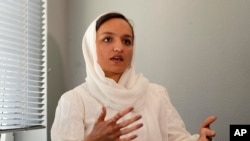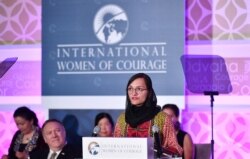Until a couple of months ago, Zarifa Ghafari, 29, was the young, female reformist mayor of a conservative town outside Kabul, Afghanistan, an emblem of the gains Afghan women have made since the 2001 ouster of the Taliban.
Today, Ghafari lives in exile in Germany, having left Kabul on a whirlwind evacuation flight less than two weeks after the Taliban swept back to power on August 15.
But she said she has not left Afghanistan for good and remains just as determined as ever to advocate for Afghan women’s rights by creating a solidarity movement.
“I hope to raise the unspoken voice of Afghan women throughout the world,” Ghafari said in an interview with VOA’s Afghanistan service.
For better or for worse, she said, the Taliban are a “reality on the ground,” and she wants to engage with them.
“The Taliban can never govern without the participation of women, who comprise more than half of the population,” she said. “So, I hope we can persuade them to accept the reality on the ground and accept women at their side. If they don’t do this, I can assure you they won’t be able to establish the kind of government they have in mind.”
In 2018, Ghafari became the youngest mayor in Afghanistan when then-President Ashraf Ghani put her in charge of Maidan Shahr, a conservative town 46 kilometers southeast of Kabul. Opposition to her appointment was swift and severe.
“When she showed up to start work, a male mob appeared, and she was forced to flee,” according to a State Department biography of Ghafari.
“Despite death threats, Ms. Ghafari came back, defying her conservative critics and their narrative that a woman is unfit to lead,” the biography said.
Her defiance of the Taliban won her international recognition.
In 2019, the BBC put her on its list of 100 inspiring and influential women from around the world. And in 2020, she was a recipient of the U.S. State Department’s International Women of Courage Award.
In June, with the Taliban closing in on her hometown, Ghafari was appointed as a senior official in the Ministry of Defense. While she survived several attempts on her life, her father was not so lucky. A colonel in the Afghan army, he was fatally shot outside his house in Kabul last year.
In the interview with VOA’s Afghan service, Ghafari said she had no choice but to leave the country because she didn’t want her seven family members to meet her father’s fate at the hands of the Taliban.
Before boarding her flight at the Kabul airport last week, she says she picked up some dirt — a piece of her country — and tied it up in her headscarf.
“I’ve brought it with me, and I hope I can return it to my country very soon,” she said. “Leaving (Afghanistan) doesn’t mean I’ve left forever. I’m optimistic that I’ll return to my country very soon. “





